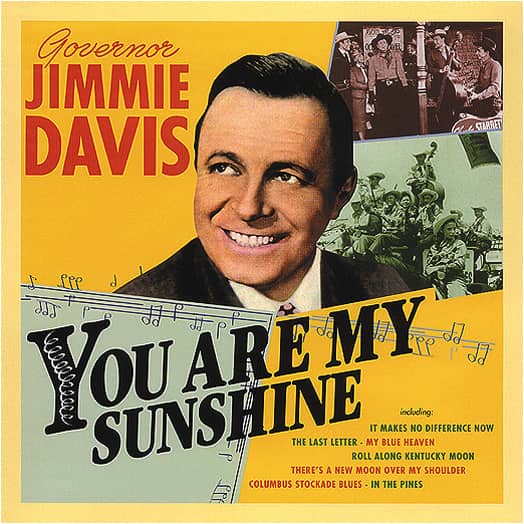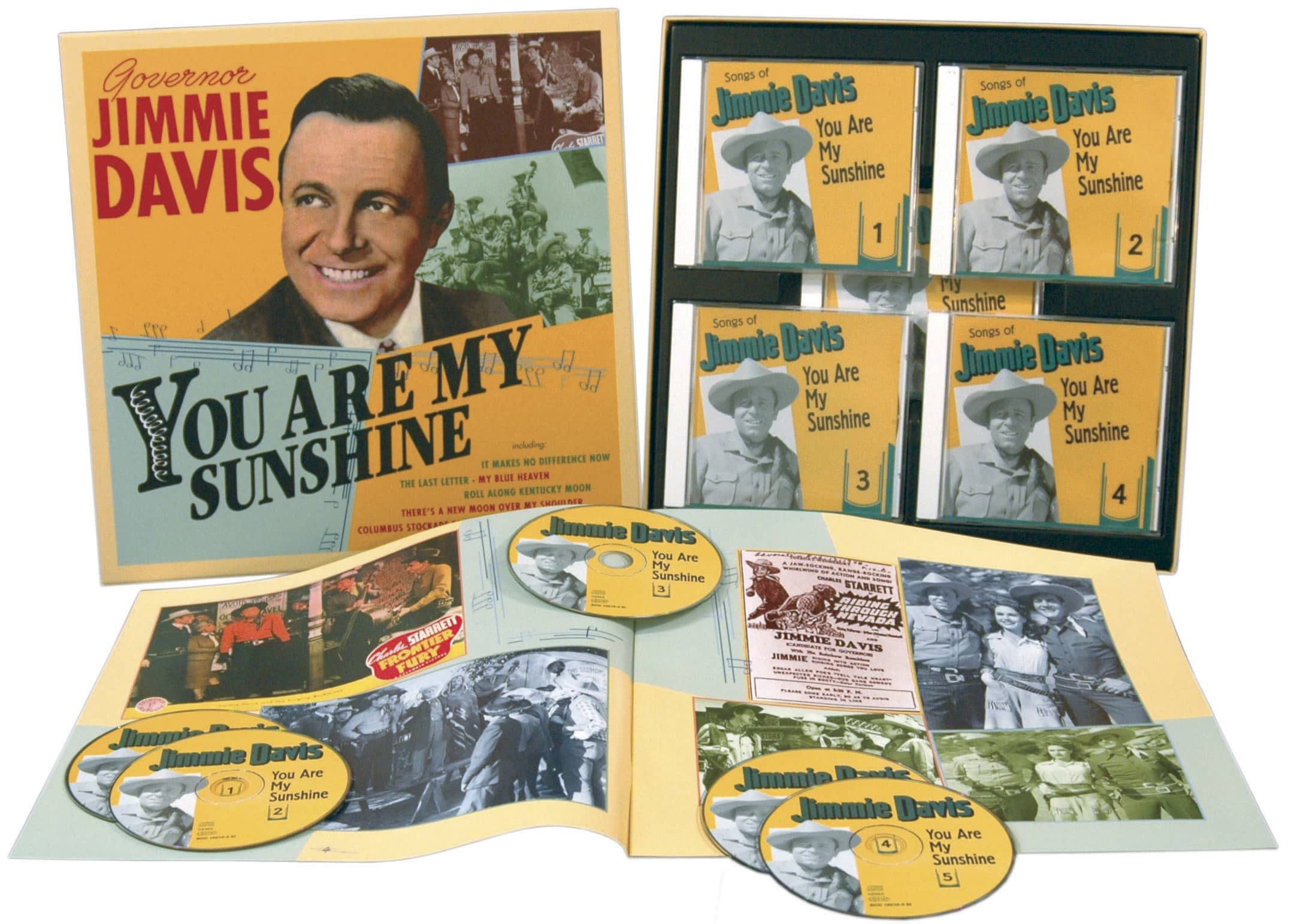Who was/is Jimmie Davis ? - CDs, Vinyl LPs, DVD and more
JIMMIE DAVIS
YOU ARE MY SUNSHINE
The Story So Far
Houston Davis was born in 1902, in Beech Springs, Jackson Parish, Louisiana, the oldest in a family of five boys and six girls. He graduated from high school, the first boy from his town ever to do so, and got his BA degree at Louisiana College at Pineville, where he sang in quartets and glee clubs, and with his guitar on street corners. Between a couple of spells of schoolteaching he took postgraduate courses at Louisiana State University in Baton Rouge, where he continued his singing activities.
In 1927-28 he had his own Friday-night radio show on KWKH in Shreveport and made his first recordings for the station's short-lived Doggone label. Later in 1928 he auditioned unsuccessfully for Columbia Records, but in 1929 he began a four-year career on Victor, during which he recorded more than 60 sides, mixing cowboy and 'heart' songs with suggestive material and blues.
In September 1934 he signed with the new Decca Record Company, an association that would last many years. Meanwhile he continued his pursuit of a career in state politics.
The Next Chapters
Jimmie Davis's first public office was as criminal court clerk in Shreveport, a post he held for eight years (1929-1937). Here he "learned about life's other side, and what he learned has stuck to him. In spite of his deceptively naive and shy manner, and the blackstrap drawl which drags out his words hypnotically, those who have seen him in action estimate him as a shrewd and experienced character." 1) His first appearances on the hustings were making speeches for the reelection of his county court boss, Judge David B. Samuel, and in 1938 he made a bid for the job of Shreveport's Commissioner for Public Safety, a post that entailed running the city's police and fire departments.
The story goes that Davis began his campaign by making a long and, he thought, persuasive speech which his audience received impassively. Finally one of them called out, "How about a little song?" Thinking it undignified, Davis declined, but pondering over it afterwards he decided to incorporate music into his campaign strategy. So next time he brought his radio band along with him and "sandwiched a short speech between tunes, where it hardly bothered at all, and won the election. He used the same method when he ran for Commissioner of Public Service in the Fall of 1942, with the same result." 2) This post gave Davis the job of regulating the state's utilities, railroads and truck-lines.
" Before that he and his band had been having a lot of fun going up in the world in their spare time. They were guests on some national hookups, and old favorites by then on the Grand Old Opry hour, the secret of success being the way they turned out new songs. Jimmie was the master mind, but he insists the whole band had a part in most of the more than 200 songs they've started." 2)
Before that he and his band had been having a lot of fun going up in the world in their spare time. They were guests on some national hookups, and old favorites by then on the Grand Old Opry hour, the secret of success being the way they turned out new songs. Jimmie was the master mind, but he insists the whole band had a part in most of the more than 200 songs they've started." 2)
Meanwhile "Hollywood inveigled him into coming out and playing in some 'horse operas'" 2): first 'Strictly In The Groove' (1942) with Johnny Bond and Jimmy Wakely, then a series of Columbia westerns featuring Charles Starrett, the Durango Kid, in which Davis usually played one of the star's sidekicks: 'Riding Through Nevada', 'Frontier Fury' and 'Cyclone Rangers'. "Jack Fier, Columbia Pictures' horse opera impresario, never lets him play anything but 'good' parts, and is excessively careful of his political future. In 'Frontier Fury' [1943] he had to shoot an Indian. Fier checked carefully first to make sure Davis had no Indian constituents before the authors put the scene in the script.
"Davis never takes a drink on the screen and never indulges in any dirty tricks. He never even trips anybody. He was to have tripped a fellow in one scene, but it was changed to a sock in the puss after the sockee's character had been proved deserving of nothing less than lynching.
"The Hollywood legend is that while making his latest picture, Davis was called away to the phone. He was gone about 15 minutes and the director exploded. Horse films are made on a very tight schedule and a delay of 15 minutes means hundreds of dollars lost. Jimmy apologized to the apoplectic director. 'A bunch of folks from Louisiana called me up,' he explained. 'They wouldn't let me off the phone until I promised to run for Governor.'" 1)
So he did, on the Democratic ticket, in 1944. Not willingly, because, as he recalls, "I was working in a few western pictures and I was recording and playing dates and making money. I had money in the bank for the first time and I knew I couldn't do that by being Governor, if I played the game straight. But it just kept on and on, people asking me if I had decided to run. I turned down a fortune." 7)
Persuaded by the outgoing Governor, Sam Houston Jones, Davis finally threw his hat in the ring -- and "just coasted into victory on the wings of song. Actually, he fought on a platform that opposed the remnants of the Huey Long organization, but his admirers were so fascinated by his corny tenor, accompanied by git-tah, that they impatiently yelled for him to stop talking and start singing." 1)
But not everywhere. "In a town where his opponent was popular, the marshal told him 'We don't want you a-rootin' and a-tootin' around here. We're too busy for any political jabber.' Charlie Mitchell, his guitarist and leader of his band, found the town so hostile that he had to pay a quarter for a chair, upon which a guitarist needs to rest his foot." 1) But Davis artfully insinuated himself into his audience's affection by devoting the whole evening to hymns commemorating recently deceased members of the community. "'Who remembers old Auntie Sue Smith,' he asked, 'who died last year when she was 104.' Then he'd sing a hymn dedicated to her. The town voted for him four to one. His enemies said the secret was a 15-minute walk through the local cemetery." 1)
Davis's successful use of music on the campaign trail needled his rivals to retaliate. "Some of his numerous opponents frantically dug up dance bands and warblers and started putting notes along with patting babies and shaking the public feet along with the public hands. It looked for a while like the whole field was clearing throats to vie on his own grounds with the 'Kingpin of Hillbillies'." 2)
"In capturing office," writes Peter Mikelbank, "[Davis] shaped a precedent-setting campaign style, using music and the traveling road show to attract large crowds. In many ways, he offered voters a 'media' candidacy well before the age of television." 7)
Jimmie Davis You Are My Sunshine (5-CD)
Read more at: https://www.bear-family.com/davis-jimmie-you-are-my-sunshine-5-cd.html
Copyright © Bear Family Records
Copyright © Bear Family Records®. Copying, also of extracts, or any other form of reproduction, including the adaptation into electronic data bases and copying onto any data mediums, in English or in any other language is permissible only and exclusively with the written consent of Bear Family Records® GmbH.

This article is deleted and can no longer be ordered!

Ready to ship today, delivery time** appr. 1-3 workdays

Ready to ship today, delivery time** appr. 1-3 workdays

Item has to be restocked

This article is deleted and can no longer be ordered!

Ready to ship today, delivery time** appr. 1-3 workdays

